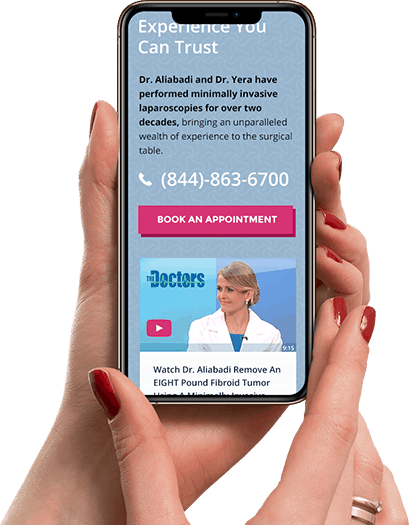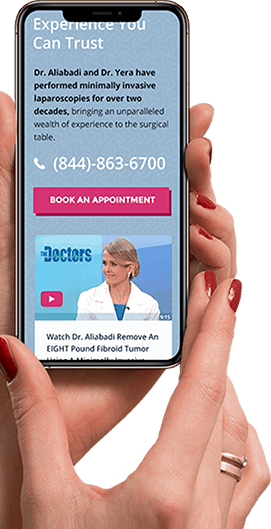There are tons of myths and misconceptions about endometriosis. Endometriosis misconceptions can prevent people with the condition from seeking or receiving appropriate care. The premier OB/GYNs at Outpatient Hysterectomy Center are experts in endometriosis diagnosis, management, and treatment.
About 10% of people with a uterus may experience endometriosis in their lifetime and it takes, on average, 10 years to receive an endometriosis diagnosis. Knowing the true facts about endometriosis can empower patients to seek diagnosis and treatment.

7 Endometriosis myths
Here are the top seven endometriosis misconceptions our doctors want to debunk:
Myth 1: A heavy period means you have endometriosis
Heavy, painful periods are a common symptom of endometriosis, but can also be caused by a wide range of gynecological conditions. Uterine fibroids, hormonal imbalances, and polycystic ovary syndrome (PCOS) can all impact your period. Adenomyosis — a condition in which endometrium-like tissue grows in the muscles of the uterus — behaves very similarly to endometriosis.
If you’re experiencing severe period pain, irregular menstrual cycles, or heavy bleeding, consult with our OB/GYNs to find the cause.
Myth 2: Young people can’t have endometriosis
A common misconception about endometriosis is that young women can’t have endometriosis. In fact, endometriosis can affect you at any age. A recent study evaluated the rates of endometriosis among adolescents. Dispelling this myth about endometriosis can save patients years of pain and decrease future problems.
Early diagnosis of endometriosis results in early intervention and treatment.
Myth 3: You can’t get pregnant with endometriosis
While many people experiencing infertility or difficulty conceiving may have endometriosis (as many as 80%!), not all endo patients will struggle to conceive. In fact, an Australian study found that 70% of participants had at least one child despite living with endometriosis.
For patients whose cause of infertility is endometriosis, there are minimally invasive treatment options to improve fertility outcomes.

Call 877-760-3564 or click here to schedule online
Myth 4: Hormonal therapy can treat endometriosis
Another popular misconception is that endometriosis can be cured with hormone replacement therapy (HRT) and hormonal contraceptives (birth control pills, IUDs, shots, etc.). While these methods can improve symptoms, they don’t do anything to treat the cause.
In addition, the effectiveness of hormone therapy for endometriosis will vary from person to person. The endometrial tissue that causes endometriosis symptoms responds to your body’s hormonal cycle, so adjusting the body’s hormones can help some people’s symptoms. However, some people experience unpleasant side effects from hormonal contraception. Our gynecologists can help find the best option for you.
Myth 5: No one knows the cause of endometriosis
While there is no straightforward cause of endometriosis, we do know risk factors that contribute to endometriosis. And we know some things that don’t cause endometriosis.
Some people mistakenly believe that endometriosis can be caused by an abortion, infection, or even douching.
The main risk factor for endometriosis is a family history of the disease.
Other factors may include starting menstruation young and continuing to have a period after menopause, an imbalance of estrogen and progesterone, a weakened immune system, exposure to environmental toxins or chemicals that mimic estrogen, and retrograde menstruation — when menstrual blood and endometrial cells flow back through the fallopian tubes instead of out through the vagina.
Myth 6: Pregnancy can cure endometriosis
Pregnancy itself does not cure endometriosis. While some patients experience temporary relief from symptoms such as pelvic pain and heavy periods during pregnancy, the underlying condition is not eliminated. This temporary relief is typically attributed to hormonal changes and increased blood flow during pregnancy.
Myth 7: Endometriosis causes weight gain
Endometriosis itself is not a direct cause of weight gain. However, some factors related to endometriosis and its treatments might indirectly contribute to changes in weight for some individuals.
Hormonal birth control can cause weight gain; chronic pelvic pain can limit physical activity; mental health problems such as stress and depression caused by chronic illness can cause weight gain; and endometriosis’s associated inflammation can impact metabolism. So, while weight gain may accompany endometriosis, it isn’t a direct symptom.
How the Outpatient Hysterectomy Center helps treat endometriosis
During her 20-plus years of practicing gynecology, surgery, and obstetrics, Dr. Aliabadi has provided countless women with medical advice to understand and fight endometriosis. There is no reason for women to suffer silently.
Outpatient Hysterectomy Center’s dedicated team of healthcare providers offers several treatment options for endometriosis depending on the symptoms and their severity.
Every person on our team, from surgeon to receptionist, is dedicated to supporting women’s health and eliminating the fear and uncertainty surrounding gynecological surgeries by creating a warm, supportive environment for our patients. Our laparoscopic endometriosis surgery is performed on an outpatient basis — meaning we send you home the same day.
We invite you to make an appointment online or call (844) 541-7900 to schedule an initial consultation.










